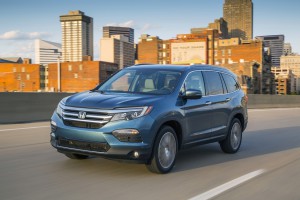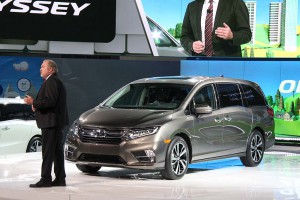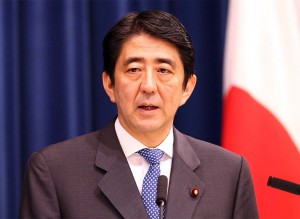Honda scored a 36% jump in earnings for the latest quarter, overcoming a variety of challenges, including a weakened yen and the cost of the ongoing Takata aitbag recall.
Cost cutting also helped overcome a slight downturn in global sales for the quarter, the third-largest Japanese automaker reporting a 168.8 billion yen, or $1.5 billion, profit for the October-December quarter, the third in its fiscal year. Honda earning 124.1 billion yen during the same period a year ago.
The automaker said it is expecting to see sales rebound slightly during the fiscal year’s final quarter, which ends on March 31. It also boost earnings guidance for the full year, though some observers question whether the automaker – like its Japanese rivals – could get caught up in a trade fracas as new U.S. Pres. Donald Trump presses the industry to move more jobs to the U.S.
(Honda, GM announce plan to jointly build fuel-cell powertrains. Click Here for the story.)
Honda was able to take something of a breather during the October-December period from the impact of a Takata scandal that could affect it for several more years. The Japanese supplier recently accepted a criminal plea deal with the U.S. Justice Department, acknowledging it has failed to take the appropriate steps after realizing there were potentially fatal problems with some of its airbag inflators.
So far, at least 16 people have died worldwide, and as many as 70 million vehicles will have to be recalled to replace those airbag systems – about two-thirds in the U.S. Honda, as Takata’s biggest customer, has born a disproportionate share of the recalls and repair costs, something that hammered the automaker’s second-quarter earnings.
It was forced to order more recalls last month, something that will hit its January-March balance sheet.
(Honda recalls another 1.3 mil vehicles for Takata airbags. Click Here for the latest.)
The lack of major recall expenses and a corporate-wide cost-cutting program helped Honda overcome some other challenges for the third fiscal quarter. Sales dropped 3%, to 3.5 trillion yen, or $31 billion, from 3.6 trillion yen the year before. The numbers declined despite strong sales in both China and the U.S.
The American results benefited from a string of new product launches, including the continuing rollout of new versions of the compact Honda Civic, as well as the launch of a newly revived Honda Ridgeline. That midsize pickup was named North American Truck of the Year during a ceremony at the Detroit Auto Show last month.
Honda will continue introducing new models in the coming months, including two sporty versions of the Civic, as well as a complete makeover of its Odyssey minivan. That model has been the best-seller in the “people-mover segment for seven years in a row.
The strong reception for its ew products has helped Honda up its forecast for the rest of the fiscal year. It now expects to sell 5.0 million vehicles, up from an earlier forecast of 4.98 million. Unit sales came to 4.7 million last year.
The carmaker also expected to end the year with a 545 billion yen, or $4.8 billion, profit. That would be up 58% from the prior fiscal year’s earnings of 344.5 billion yen, and its original full-year expectation of earning 415 billion yen, or $3.6 billion. A favorable shift in the exchange rate should also help, the maker said.
Honda’s buoyant expectations come at a time of significant uncertainty in the auto industry. Since launching his campaign in 2015, then-candidate Trump has made jobs a key issue, and he has put a spotlight on an auto industry that has been shifting manufacturing to Mexico in recent years.
While he initially focused on Ford Motor Co., since the beginning of the year, Trump has expanded his scope to other manufacturers, including Japan’s Toyota. But Honda officials appear to be upbeat about any prospects for a crackdown on automotive imports because the carmaker already assembles in the U.S. the vast majority of the vehicles it sells in the market. That would mean less of a shake-up of its operations than some competitors might face, they have said.
Japanese Prime Minister Shinzo Abe is set to meet with Trump at the White House next week, with trade and security expected to dominate the conversation.
(Trump widens tariff threat. Click Here for the story.)



